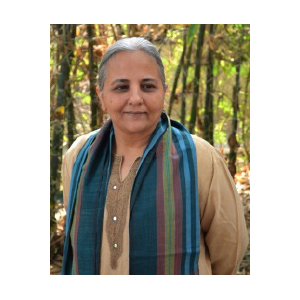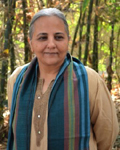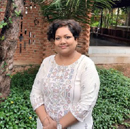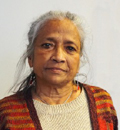How can we deliver a gender-inclusive climate transition in India? Video

Read a summary of the event here
Our panel highlighted and addressed the critical role of gender inclusivity in India’s climate transition, providing actionable insights for researchers and stakeholders to identify key areas for building women’s resilience and participation in a greener, more equitable future.
The panel discussed:
- Gender segregation in the current labour market and new green job opportunities.
- The role of women working in the coal economy and strategies for a just transition.
- The barriers to women’s access to climate finance.
We also held an audience Q&A at the end of the online event.
Speakers and chair
Keynote speaker
Reema Nanavaty, Executive Director of Self Employed Women’s Association (SEWA) India, the single largest union of informal sector women workers.
Panel members
Dr. Garima Sahai, Research Associate, Department of Geography, University of Cambridge, UK.
Dr. Suravee Nayak, Associate Fellow with the Sustainable Futures Collaborative Research Foundation (SFCRF) at Delhi, India.
Dr. Sohini Kar, Associate Professor in the Department of International Development at the London School of Economics.
Dr. Swayamprabha Das, Associate Vice-President and Lead for Policy Research and Planning with Development Alternative Group.
Chair
Professor Naila Kabeer, Professor of Gender and Development in the Department of International Development at the London School of Economics.
Biographies

Reema Nanavaty is Executive Director of SEWA, India, the single largest union of informal sector women workers. She is currently the member of the Advisory Council on Gender of the World Bank Group.
Reema oversees 4,813 self-help groups, 160 co-operatives and 15 economic federations – pan-India including 18 states and in seven South Asian countries – focusing on women’s economic empowerment by building women-owned enterprises, developing women-led supply chains, introducing modern ICT-based tools, and facilitating green energy initiatives and livelihoods.
Reema represented informal sector workers, women workers, self-employed workers, and the rural workers’ union at the International Labour Organization’s High-Level Global Commission on Future of Work. She was also a member of the working group for the UN High-level Dialogue on Energy, and as a Gender lead in the Working group for the UN’s Food System Summit convened by UN General Secretary in the United Nations General Assembly, 2021. She was invited to speak alongside UN secretary General Antonio Gueteras in the Official Opening Ceremony of the UN’s Food Systems Summit 2021.
Reema has facilitated rebuilding lives and livelihoods of rural women affected by earthquakes and riots in India, training women in Afghanistan on different livelihood skills, and facilitating the creation of their own local association. Similarly, she has also led the rehabilitation programme for war-affected widows in Sri Lanka.
She is a Padma Shri awardee (the fourth highest civilian award in the Republic of India) for her contribution in area of social services in 2013.

Dr. Garima Sahai is a Research Associate, Department of Geography, University of Cambridge, UK. Her interdisciplinary research interests centre on issues of youth, gender in the Global South. Dr. Sahai is currently the research and project lead on a multi-partner project on Green Jobs and Youth Voices at the University of Cambridge. The project focuses on four countries across sub-Saharan Africa – Ethiopia, Ghana, South Africa and Uganda. The objective of the project is to research the availability, attitudes, understandings, and possibilities for green job creation with and for young people.
Dr. Sahai holds a PhD in Sociology from the University of Cambridge. Her doctoral work focused on young women’s entry into non-traditionally female jobs in India. Previously, she worked for three years at the World Bank, as an economist and a labour and gender specialist.

Dr. Suravee Nayak is an Associate Fellow with the SFCRF in Delhi, India. Her research interests include energy and labour, political economy of coal, energy transitions, extractive industries, critical agrarian studies and nature-society relations. At SFCRF, she focuses on the political economy of coal dependency, coal transitions, and ‘just transition’ in India. Prior to joining SFCRF, she was an Associate Fellow with the Initiative on Climate, Energy and Environment at Centre for Policy Research, Delhi.
Dr. Nayak submitted her PhD thesis with the Centre for Development Studies, Thiruvananthapuram, India, where she researched the political economy of coal mining in India, particularly understanding various socioeconomic ecological transitions in coal-dependent economies. While pursuing her PhD, she was also a Visiting Doctoral Researcher at the School of Global Studies, University of Sussex, UK, in 2019.

Dr. Sohini Kar is an Associate Professor in the Department of International Development at the London School of Economics. She is a socio-cultural anthropologist focusing on economic anthropology of South Asia, particularly urban India. Her work examines the impact of increasing financialization on poverty and development, including microfinance. Her current research focuses on activism and financial markets, and on the political economy of heat in urban India.

Dr. Swayamprabha Das is serving as Associate Vice-President and Lead for Policy Research and Planning with Development Alternative Group. She recently completed her assignment with India’s G20 Secretariat, with a focus on environment and climate sustainability, and development. Over two decades, her work covers natural resource management (NRM), climate change, marine conservation, human development, skilling development (women) and gender, demonstrating an interdisciplinary approach.
She holds a Doctorate from Jawaharlal Nehru University in international relations (environment policy and diplomacy), and is a Hubert Humphrey Fellow with an NRM focus with University of California, Davis, CA.
Dr. Das is also the Regional Deputy Vice Chair (South & East Asia) of the International Union for Conservation of Nature (IUCN) Commission on Environmental Economic and Social Policy, and a member of IUCN Commissions on Ecosystem Management and Education and Communication.

Professor Naila Kabeer is the Professor of Gender and Development in the Department of International Development at the London School of Economics. She is also on the faculty of the International Inequalities Institute at LSE.
Professor Kabeer has extensive experience in research, training, teaching and policy advice in the related fields of gender, poverty, labour markets, livelihoods, social protection and collective action. She has also published extensively on these issues, including a number of books.
She is on the editorial board of Feminist Economics and Gender and Development, advisory editor of Development and Change and the International Advisory Board of the Canadian Journal of Development Studies. She is also on the advisory boards of the United Nations Research Institute for Social Development and the UNU-International Institute for Global Health.

